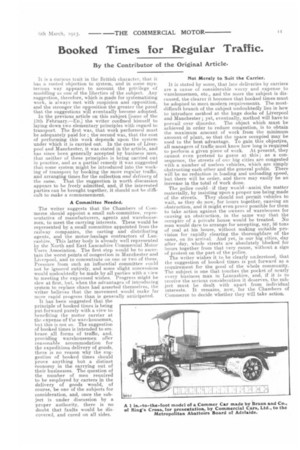Booked Times for Regular Traffic.
Page 13

If you've noticed an error in this article please click here to report it so we can fix it.
By the Contributor of the Original Article.
It. is a curious trait in the British character, that it has a rooted objection to system, and in some mysterious way appears to account the privilege of muddling as one of the liberties of the subject. Any suggestion, therefore, which is made for systematizing work, is always met. with suspicion and opposition, and the stronger the opposition the greater the proof that the suggestions will eventually become adopted.
In the previous article on this subject [issue of the 13th February.—En.] the writer confined himself to laying down two elementary principles with regard to transport. The first was, that work performed must be adequately paid for ; the second was, that the cost of performing this work depends upon the system under which it is carried out. In the cases of Liverpool and Manchester, it was stated in the article, and has since been generally accepted by business men, that neither of these principles is being carried out in practice, and as a partial remedy it was suggested that some system might be introduced into the working of transport by booking the more regular traffic, and arranging times for the collection and delivery of the same. That the suggestion is worth discussion appears to be freely admitted, and, if the interested parties can be brought together, it should not be difficult to make a commencement.
A Committee Needed.
The writer suggests that the Chambers of Commerce should appoint a small sub-committee, representative of manufacturers, agents and warehousemen, to meet the carrying interests. These would be represented by a small committee appointed from the railway companies, the carting and distributing agents, and the motor-haulage contractors of Lancashire. This latter body is already well represented by the North and East Lancashire Commercial Motor Users Association. The first step would be to ascertain the worst points of congestion in Manchester and Liverpool, and to concentrate on one or two of these. Pressure from such an influential committee could not be ignored entirely, and some slight concessions would undoubtedly be made by all parties with a view to meeting the expressed wishes. Progress might be slow at first, but., when the advantages of introducing system to replace chaos had asserted themselves, the writer believes that the movement would make far more rapid progress than is generally anticipated.
It has been suggested that the principle of booked times is being put forward purely with a view to benefiting the motor carrier at the expense of the warehouseman, but this is not so. The suggestion of booked times is intended to embrace all forms of traffic, and, providing warehousemen offer reasonable accommodation for the expeditious delivery of goods, there is no reason why the suggestion of booked times should prove anything but a distinct economy in the carrying out of their businesses. The question of the number of men required to be employed by carters in the delivery of goods would, of course, be one of the subjects for consideration, and, once the subject is under discussion by a proper authority, there is no doubt that faults would be discovered, and cured on all sides. Not Merely to Suit the Carrier.
It is stated by some, that late deliveries by carriers are a cause of considerable worry and expense to warehousemen, etc., and the more the subject is discussed, the clearer it becomes that booked times must be adopted to meet modern requirements. The mostdifficult branch of the subject undoubtedly lies in how to introduce method at the huge docks of Liverpool and Manchester i yet, eventually, method will have to prevail over disorder. The object which must be achieved in order to reduce congestion, is to obtain the maximum amount of work from the minimum amount of plant, so that the space occupied may be used to the best advantage. To gain this objective, all managers of traffic must know how long is required to perform a. given piece of work. At present, they cannot even pretend to guess at this; as a consequence, the streets of our big cities are congested with, a number of useless vehicles, which are simply obstructing each other and the general public. There will be no reduction in loading and unloading speed, but there will be order, and there may easily be an increase in the total of work done.
The police could—if they would—assist the matter niaterially, by insisting upon a proper use being made of the streets. They should not permit vehicles to wait, as they do now, for hours together, causing( an obstruction, and it might even prove possible for them to take action against the owners of warehouses for causing an obstruction, in the same way that the occupier of a private house would be treated. No man would dare to arrange for accepting, say, 50 tons of coal at his house, without making suitable provision for rapidly clearing the thoroughfare of the same, on its arrival. And yet, in our big cities, day after day, whole streets are absolutely blocked for hours together from that very cause, without a sign of protest on the part of the police. The writer wishes it to be clearly understood, that the suggestion of booked times is put forward as a requirement for the good of the whole community. The subject is one that touches the pocket of nearly every business man in Lancashire, and, if it is to receive the serious consideration it deserves, the subject must be dealt with apart from individual interests. It remains, now, for the Chambers of Commerce to decide whether they will take action.
























